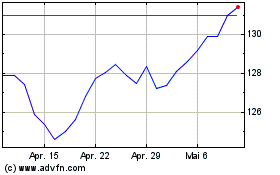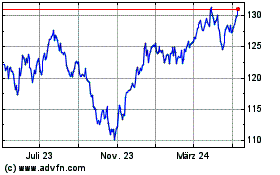Russell Launches Two New Dividend ETFs - ETF News And Commentary
23 März 2012 - 7:45AM
Zacks
Thanks to risks in the market and extreme stock volatility over
the past few years, many investors sought out more stability in
their portfolios along with high levels of current income.
Unfortunately, bond yields were quite low pushing many into high
dividend paying stocks instead.
Beyond individual securities, investments in equity ETFs which
have stocks that pay high dividend yields emerged as a source of
decent income for investors at this time. This has proven to be a
pretty good strategy as intermediate term bonds are still yielding
below broad stock markets and equities are rising higher so far in
2012 as well (Emerging Markets Dividend ETFs for Income, Growth
& Diversification).
Risk in Dividend ETFs
While dividend-focused ETFs may be safer than other equity
funds, they are by no means risk-free. These securities still have
market risk and can experience more volatility than their bond
cousins.
Furthermore, there is always the risk that dividends could be
cut if a company runs into trouble while bond investors are more
likely to see their payments paid out on a regular basis thanks to
their improved position in a liquidity event (Is The Bear Market
For Bond ETFs Finally Here?).
Russell Product Launches
Nevertheless, Russell Investments, a global asset manager, looks
to continue its push in the space with the launch of two new high
yield dividend ETFs. These funds are exposed to stocks that offer
high dividend yields, helping to supplement current income at this
time.
The two ETFs, the Russell High Dividend Yield
ETF (HDIV) and Russell Small Cap High Dividend
Yield ETF (DIVS) have been designed to replicate the
performance of the U.S. Large Cap High Dividend Yield and Russell
U.S. Small Cap High Dividend Yield Indexes, respectively, giving
investors access to a portfolio of stocks in the U.S. market that
have outsized yields.
The two funds seek to build their investment portfolio by not
only including those companies with high dividend yields, but also
by evaluating each company on quality metrics. These metrics hope
to find companies that have the capacity to payout more in
dividends, grow their current payouts, while still having strong
earnings.
This quality characteristic is then assessed on the basis of
various financial measures such as cash flow generation capacity of
the company, return on equity and what analysts expects as regards
to the future earnings of the company.
By using this method, Russell looks to bring greater
transparency to the stock selection approach while avoiding some of
the pitfalls that hit many other products in the space. For
example, many other funds concentrate solely on high yields without
any scrutiny on financial strength, a situation that can lead to
trouble if payouts start to become in danger.
Russell High Dividend Yield ETF (HDIV)
This fund, which looks to be passively managed, will track the
performance of the Russell U.S Large Cap High Dividend Yield Index.
The Index is a subset of the Russell 1000 and includes those stocks
which have the highest dividend yield while passing the screening
criteria lined-out above. The index holds a total of 75 stocks with
Kraft Foods (KFT) being at the top position of the
list.
The concentration risk of the ETF seems to be very high with 50%
of asset invested in the top 10 holdings of the company, indicating
the fund is not very well spread out (Alternative ETF Weighting
Methodologies 101). The fund will charge a fee of 33 basis points a
year for its services, roughly in line with other products in the
space.
Small Cap High Dividend Yield ETF (DIVS)
This fund has been designed to replicate the performance of the
Russell U.S. Small Cap High Dividend Yield Index. The Index is a
subset of the Russell 2000 and represents those stocks from the
parent index which offers high dividend yields that are
sustainable. The fund will hold a total of 150 stocks with expense
ratio of 38 basis points.
Equity ETF Competition
The universe of dividend ETF has more than 40 funds designed to
meet investor needs across a variety of sectors. The most popular
among these is the Vanguard Dividend Appreciation
(VIG). VIG has been specifically designed to include those
companies in its holding list which have increased their dividends
in the each of the last 10 years and tracks the performance of the
Dividend Achievers Select Index.
VIG is one of the inexpensive funds in the ETF dividend space
with an expense ratio of just 0.18%. The fund has a dividend yield
of 2.23% and total return of 6.19% over one year period. VIG also
has a history of constant dividend payments since its inception in
2006 (read Top Three High Yield Financial ETFs).
Another ETF which has been popular among the investors is
SPDR S&P Dividend (SDY). The fund, which is
passively managed, replicates the performance of the S&P High
Yield Dividend Aristocrats Total Return Index. SDY has been
specifically designed to include those companies in its holding
list which have increased their dividends in each of the last 25
years. The ETF charges fees of 35 basis points and delivered a
total return of 7.25% over the past year.
Market uncertainty leads to increased investments in dividend
ETFs as investors seeks for a certain level of income by their
side. But consistency in dividend payment and how financially
strong actually the company is should also be key considerations
for choosing a dividend ETF.
Due to this factor, the recently launched products from Russell,
DVIS and HDIV, could see a great deal of inflows from a number of
investors. The funds will face heavy competition but their targeted
portfolios and quality controls could help to mitigate some risks
and make the new funds among the safest choices in the dividend ETF
world.
Want the latest recommendations from Zacks Investment Research?
Today, you can download 7 Best Stocks for the Next 30
Days. Click to get this free report >>
KRAFT FOODS INC (KFT): Free Stock Analysis Report
To read this article on Zacks.com click here.
Zacks Investment Research
Want the latest recommendations from Zacks Investment Research?
Today, you can download 7 Best Stocks for the Next 30 Days. Click
to get this free report
SPDR S&P Dividend (AMEX:SDY)
Historical Stock Chart
Von Nov 2024 bis Dez 2024

SPDR S&P Dividend (AMEX:SDY)
Historical Stock Chart
Von Dez 2023 bis Dez 2024
